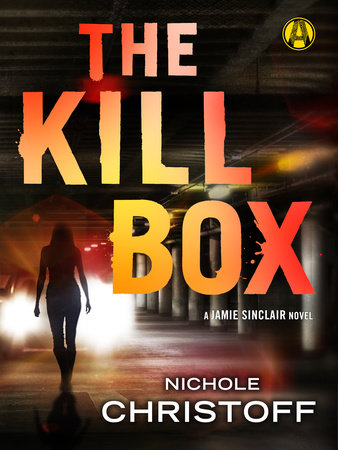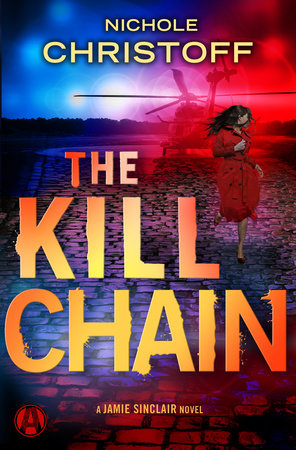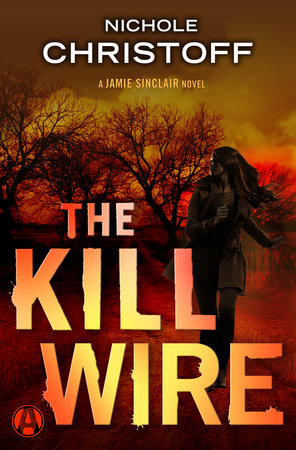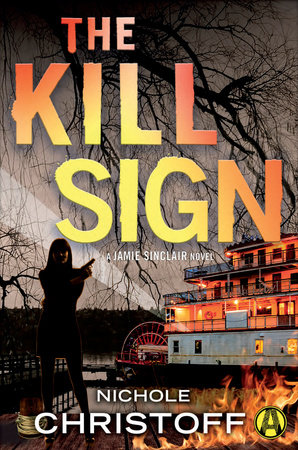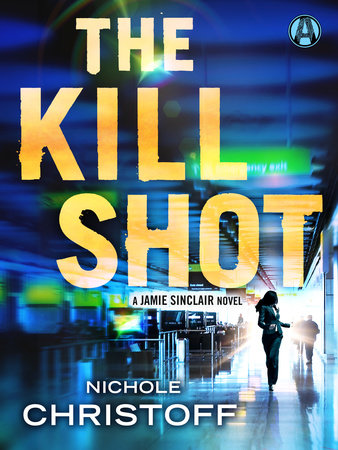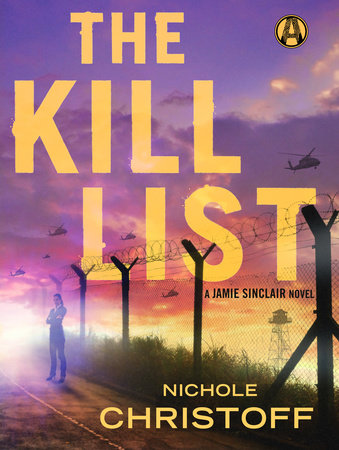Excerpt
The Kill Box
Chapter 1
“What kind of private investigator wears silk to a sting operation?” Marc Sandoval grumbled.
His fast hands were full of my satiny charmeuse shirt, and I fought to control a shiver as the fabric slipped along my skin. The audio technician at my elbow pressed a palm to the headphones she wore over her pixie cut as if she were listening to a classified communiqué. But she couldn’t fool me. She’d been getting a kick out of the play-by-play between Marc and me all day. And her smug smile said so.
Marc, in the meantime, gave my shirttails another tug. “Damn it, Jamie. You don’t even have room under here for a Kevlar vest.”
“I’ve got room for a listening device,” I reminded him.
And the listening device was all that mattered to me.
Beneath my blouse, taped to my chest, the microphone I wore was so sensitive, it would register my heartbeat if the thing broke away from its adhesive and slipped south along my breastbone. Its chilly wire snaked across my ribs before Marc fished its connector from the hem of my top. He snapped the end of it into a transmitter. And he clipped the transmitter to my trousers’ waistband at the small of my back. But even as the tech fired it up for another sound check, Marc’s hands hesitated like he wasn’t quite ready to let me go.
I tossed my dark ponytail over my shoulder, took a seat on the edge of the porcelain sink behind me, and shot him my best don’t-get-sappy-on-me smile. “Come on. This private investigator is a security specialist. You ordered her to look like a woman with both feet on the corporate ladder. Silk shirts are part of that look. Kevlar isn’t.”
And this was true.
Powerful women in Washington, D.C., wore elegant underpinnings, finely tailored suits, and exquisite accessories at least six days a week. Thanks to my tailored trousers and silk blouse the color of a politician’s blush, I fit perfectly into that crowd. In fact, I fit in so well, Marc had arrested me when he’d met me two weeks ago.
Because Marc Sandoval was a special agent with the Drug Enforcement Agency.
And at the request of my client, I’d posed as a pharmaceutical corporation’s upper-level grunt—ready, willing, and able to bribe the Food and Drug Administration.
That’s how Marc and I came to be holed up in a closed-but-crowded ladies’ restroom in the middle of Reagan National Airport on a Tuesday afternoon in late October. His six-man tactical team, dressed head-to-toe in riot gear, knelt on the floor’s dull and dingy tiles to check over their weapons. And his communications crew fiddled with a bank of portable monitors blocking the bathroom’s row of hand-dryers. Those monitors would give us a bird’s-eye view of our approaching target: a bent FDA official named Stan Liedecker.
Before the advent of the FDA, anyone could make a profit by adding anything to food, drink, or medicine and selling it to the unsuspecting public. And I do mean they could add anything. Opium and arsenic, cocaine and copper turned up in products from cosmetics to children’s cough syrup.
But the Food and Drug Administration put a stop to all that.
Now drugs are manufactured and marketed under the FDA’s uncompromising eye. Safety has become big business. And no business is bigger than today’s pharmaceutical industry.
Case in point: Hudson Paul, my client and the chief operating officer of a firm called Pharmathon, had money to burn. Located in Tysons Corner on the edge of D.C.’s infamous Beltway, Pharmathon was one of the best and brightest drug companies in the USA. But, as Hudson explained, sitting in a guest chair in my Georgetown office, Pharmathon was also one of the top-grossing pharmaceutical companies in the entire world—with both its thumbs buried deep in the industry’s $300-billion pie.
Money that large can make people do stupid things. And Hudson had come to me because one of his top employees had done something very stupid indeed. A frustrated vice president had tried to bribe Liedecker to allow a problematic Alzheimer’s drug to bypass clinical trials—and hit the market untested—just so the competition couldn’t claim all the profits that would be up for grabs while Pharmathon worked out the kinks in its formula.
Hudson found out and fired the guy before any money changed hands. Or any patients stroked out from taking Pharmathon’s unproven pills. But that didn’t stop the situation from going from bad to worse.
One night, Liedecker, pissed that he never got his payoff, cornered Hudson in Pharmathon’s parking lot—with his hand open and itching. In no uncertain terms, he invited Hudson to pay up so he’d hush up. And if my client didn’t meet the blackmail demand, Liedecker promised to use his FDA clout to shut down Pharmathon in its entirety—and see Hudson Paul charged as the brain behind the vice president’s attempted bribery.
I took Hudson’s case and posed as his most trusted employee. Near a hamburger stand on the National Mall, I met with Stan Liedecker to talk terms. But unbeknownst to me, Marc Sandoval had the man under surveillance.
And Marc was damn good at his job.
So he arrested me before I reached my parking spot.
When Marc learned I was a PI, he’d thundered like a fallen angel. But after he’d read me the riot act, it dawned on him: Stan Liedecker believed I would buy him off. So if Marc allowed me to give Liedecker his cash, Marc could arrest the bastard with dirt on his hands.
Marc’s own hands were quick and strong. I’d found that out when he announced he’d wire me up himself. With the self-assurance of a neurosurgeon, he’d loosened the impeccable knot in his ruby-red tie, rolled up the sleeves of his made-to-measure dress shirt, and ordered me to unbutton my clothes. But despite Marc’s overabundance of confidence, I didn’t miss the crease of concern marring his forehead. Or the way he kept muttering about me and Kevlar.
“Relax,” I told him. “I don’t need Kevlar. Liedecker’s harmless, and I’ve got you and your team to back me up.”
“Just don’t test that theory, all right?”
Marc sent the sound tech on her way, snatched my charcoal-gray suit coat from a hook on the tiled wall, and handled it with all the finesse of a bullfighter. When he helped me into it, his fingertips lingered on my lapels. And if I didn’t know better, I’d have said the evening star sparkled in his obsidian eye.
“Be careful, Jamie.”
“I’m always careful,” I replied.
And I meant it.
Marc opened his mouth to say something more. But an agent manning a monitor interrupted him. “Time to boogie.”
Marc and I turned. And there, on one of the electronic screens, was Stan Liedecker, strutting through the parking structure like he’d just won the lottery. I shoved my nerdy, square-rimmed glasses up the bridge of my nose, grabbed the handle of the ordinary leatherette briefcase Marc had had filled for me, and strode out to meet him.
Reagan National Airport is a long string of terminals, linked one to another like beads on a bracelet. Sandwich shops and newspaper stands hug the curving walls, trying to tempt travelers into spending their cash before boarding their planes. In front of an establishment called Capitol Coffee, I found Liedecker sitting at a little bistro table, sipping something steamy from a paper cup.
In a maroon sweater, worsted wool pants, and penny loafers, he was dressed like every other late-middle-aged Washington stuffed shirt on his day off. He’d brought an overnight bag with him. It rested on the chrome chair beside him. I supposed he had his toothbrush in it—and his bankbook for his offshore account, too. I could make out his round-trip ticket to the Cayman Islands protruding from the bag’s end pocket like a feather in a hat.
But I had what Stan Liedecker really wanted.
He grinned like a fat cat who’d swallowed too much cream when he caught sight of me approaching his table.
I slid into the seat across from him, stood the briefcase upright on my lap.
“I’d buy you a cup of coffee,” he said, “but I’m about to board my plane.”
“That’s all right.” I patted the side of the leatherette case. “I’ve brought you a parting gift.”
Marc had made sure the case was full of the well-worn fifty-dollar bills Liedecker had demanded. Altogether they weighed close to twenty pounds. And were worth half a million dollars.
“Payment in full,” I said, though I knew guys like Liedecker always came back for another touch. “You’ll stick to your end of the bargain?”
“Of course.” He nodded. And he smiled.
But I needed him to spell it out. I needed him to say I was buying his influence at the FDA with this money. And I needed him to admit he was willfully breaking the law so the wire I wore could transmit his confession to the authorities.
Instead, Stan Liedecker slid a little plastic baggie across the table to me. “This is for you.”
A baker’s dozen of waxy pink-and-white capsules gleamed inside the bag.
“What are they?”
“Just a recreational indulgence someone at another company cooked up.”
I didn’t touch the packet.
Liedecker chuckled. “Don’t worry. They’re on the house. I can get you more if you like. And tell your boss I’m still willing to fix his clinical trial problem. For another half mill, of course.”
Liedecker grinned at me. I wanted to slam the heel of my hand into his nose and feel the satisfying crunch of his splintered cartilage beneath my pulse, but I made nice and smiled at him in return. After all, he’d just said the words that would sound so good in front of a federal judge.
“Well,” he said, glancing at his Rolex. “Mustn’t be late.”
He rose from his seat, reached for the briefcase.
I stood and gladly offered it to him. Because the second the man’s liver-spotted hand curled around the handle, Marc would move in. He’d arrest Liedecker. The scumbag would face jail time for illegally lining his pockets. And for offering to approve untested drugs that could kill people.
But things didn’t happen that way.
A lady with a tight perm and a loose cardigan paused as she passed our table. She let out an ear-piercing squeal, dropped her orange plastic Capitol Coffee tray as if it had bitten her. Hot liquid splashed everywhere. Liedecker and I looked down to see fat drops of coffee bead on his shiny shoes. We looked up and followed the woman’s pointing finger.
Halfway across the open expanse of the terminal, Marc was on the move, closing in like a bird of prey. His helmeted agents zoomed toward us like a swarm of hornets. Their flat-black assault rifles were nocked to their shoulders—and each one aimed at Liedecker.
“Guns!” the woman shrieked.
Heads turned. Travelers screamed. Men and women ran every which way. Some cowered on the floor. Panicked parents dragged their children behind the cover of trash cans or concrete planters full of ficus—just in case bullets began to fly.
But none of this fazed Stan Liedecker.
With a snarl, he shoved the briefcase into my chest. My arms locked around it as the impact knocked me back a step. That’s when Liedecker grabbed me by the shoulders.
“You sold me out!”
I gritted my teeth, twisted up and out, and slammed the edge of the briefcase into Liedecker’s wrist. But I couldn’t break his grip. He jerked me to him, spun me around—and wedged his arm across my throat in a fierce headlock.
Marc’s eyes locked with mine. His hand dove beneath his suit coat. It came up with his service weapon.
“Stand back!” Liedecker shouted at him. “Everyone just stand back or I’ll break this woman’s neck!”
He’d do it, too. I knew he would. Especially when his groping hand plunged beneath my jacket. It closed over the transmitter clipped to my trousers. Liedecker ripped it free of its wire, threw the thing to shatter on the floor.
At my back, his body quivered with rage. And the pressure he applied to the point of my chin strained the muscles in my neck. I was certain he’d carry out his threat.
I was certain he’d snap my spine.
Marc and his agents were certain, too. They froze where they stood. But they didn’t lower their weapons.
Adrenaline shivered through me like a sickness. But so did fear. And I refused to give in to it.
I swallowed against the pressure at my throat, dredged up all the authority I could muster, and made my voice strong with it. “Think it through, Stan. You hurt me, I fall. And all those agents get a clear shot at your center mass.”
“Then you’re coming with me,” he snapped, “because I’m getting on that plane. And you’re holding my bankroll.”
He was right.
I still cradled the briefcase to my chest.
He jerked me backward, forced me to keep in step with him. We weren’t far from his gate. Or from his plane.
“You’ll never get on board,” I warned.
“Who’s going to stop me? The TSA?”
“No. I will.”
Liedecker snorted and his arm drew tighter. “That’s big talk for one of Pharmathon’s pretty little technocrats. What are you really? A federal marshal?”
“I’m mad as hell,” I lied, “so be smart and let me go.”
But Liedecker had other ideas. He shoved my chin high and hard. Pain lanced my brain box—and my fingers flicked the clasps on the top of the briefcase.
The lid of the little valise dropped open.
And all of Stan Liedecker’s glorious cash slipped from inside.
Stan gasped as an avalanche of fifty-dollar bills tumbled to his feet and streamed across the floor. Like the greedy bastard he was, he let go of me to grab them. And when he bent to rake at his money, I didn’t hesitate.
I slammed the blade of my hand into the base of his skull. Muscle and bone met the soft spot at the top of his neck. Stan Liedecker gurgled. He dropped to his knees. And when he fell face-first onto the floor, his head went thump against the hard surface—just like a rotten melon.
Of course, from where I stood, it sounded rather like justice.


